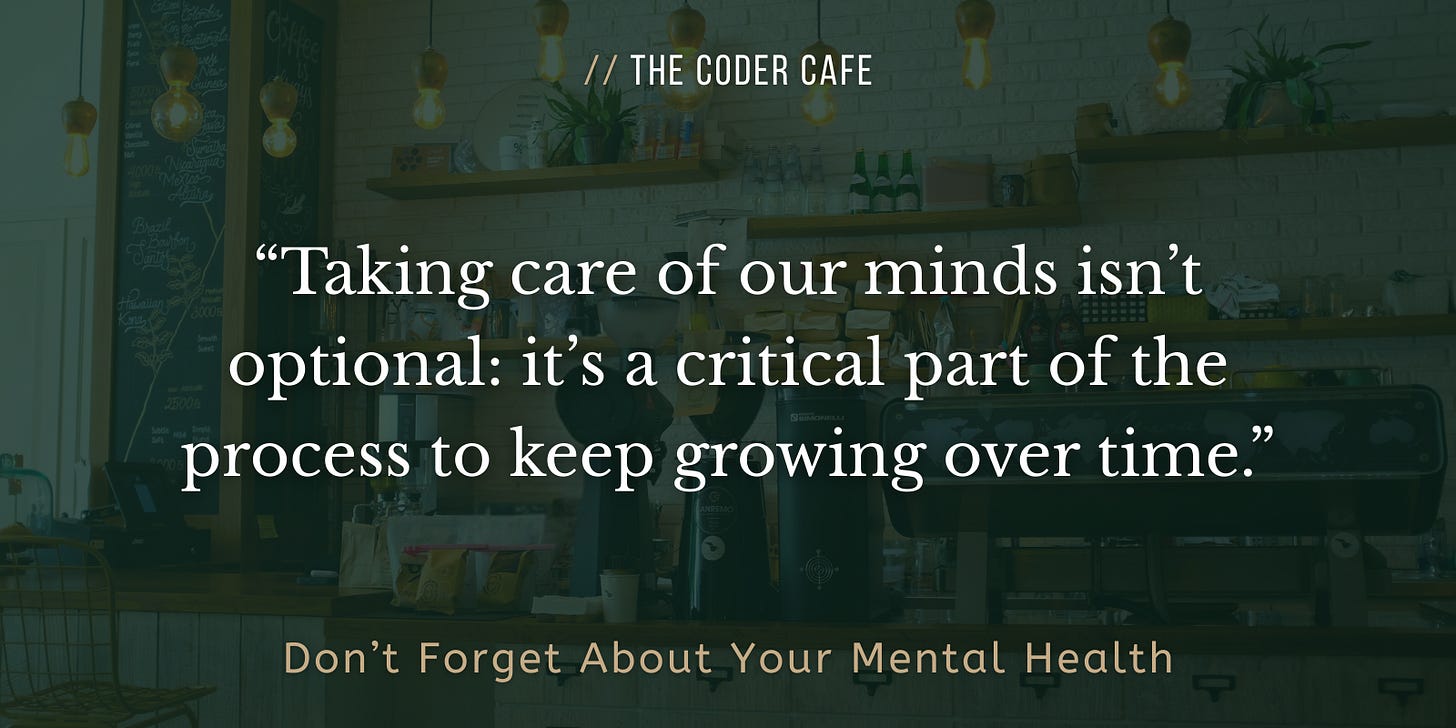This week marks Mental Health Awareness Week in the UK. Given this important occasion, I wanted to take some time to reflect on mental health, especially in tech, where it isn't always openly discussed.
In tech, we often celebrate how much we accomplish: how fast we ship, how many hours we invest, how many open-source projects we juggle after work, etc. Yet, behind all these celebrations, something important often gets overlooked: our mental health.
We rarely talk openly about mental struggles or the exhaustion that may come from working in an industry that rewards constant hustle.
This post is a reminder (for all of us, including me) that taking care of our minds isn’t optional: it’s a critical part of the process to keep growing over time.
Manage Your Energy, Not Your Time
Time is constant1. We all get the same 24 hours, day after day. Yet, have you noticed how some days feel wildly more productive than others, even when our schedule looks exactly the same?
That difference usually isn’t about having more time. It’s about having more energy, especially mental energy.
We tend to think burnout happens when we run out of time. But burnout really sets in when we run out of energy and keep pushing anyway, when we ignore what our mind and body are telling us just because our calendar says we’re “free“.
If our energy is low, our mental health is trying to tell us something, and we should listen.
Managing our energy instead of our time means respecting our limits and acknowledging that we are not machines. For example, there are days when my energy is low, and through experience, I’ve learned it’s usually far better to take care of myself first rather than forcing myself to write another post. Do whatever helps you refill your energy: rest, take a walk, play video games, whatever works for you.
It’s not laziness. A career is a marathon, not a sprint. Burnout happens when we push ourselves too hard, too often. Thinking long-term means paying attention to our energy because it’s the best indicator we have for how sustainable our pace really is.
Don’t Compare Yourself to Others
One of the quickest ways to harm our mental health is by constantly comparing ourselves to others. When we keep looking at what everyone else is doing, we start to question if we’re doing enough.
A few years ago, I saw a former classmate working as a senior software engineer at Netflix. At the time, it made me feel like I was falling behind. But looking back, I realize I was just being too hard on myself.
If you've ever felt the same, remind yourself of this: you're not behind, you're just moving at your own pace.
Comparing ourselves to others becomes even more harmful on social media. It's easy to scroll through and see people who seem more successful than we are. But the truth is, social media rarely shows the full story. We don't see their struggles, rejections, or failures. We're mostly seeing the bright side.
If scrolling leaves us feeling anxious or not good enough, it’s totally okay to take a break. Stepping back helps us refocus on ourselves and reminds us what truly matters: our own journey at our own pace.
It’s Okay to Struggle Sometimes
Sometimes, we can go through tough periods, not just bad days, but weeks or even months. We might feel anxious, unmotivated, disconnected. It can be hard to focus, hard to care, hard to show up. That doesn’t mean we’re weak; it means we’re human.
We don’t have to be perfect all the time. We don’t have to hide our struggles or pretend everything is fine. Life has ups and downs, and it’s okay to move through these difficult periods without guilt, regardless of the reasons.
When we're struggling, one of the best things we can do is talk to someone: a friend, a partner, a mental health professional, whoever. There's always someone who can help us carry the load. Just sharing what we're feeling out loud can lighten the emotional weight a little.
And if we're in an company where we can't openly talk about mental health, where we can't admit we're struggling without fear or judgment then that's a company issue, not ours. If our working environment doesn't support our well-being, it’s probably not the right place for us.
Everyone goes through hard times. What matters most is giving ourselves permission to feel, heal, and reach out when we need support.
Final Thoughts
Mental health isn’t something separate from our work; it’s at the heart of it. Managing our energy, avoiding comparison, and accepting that it's normal to struggle are essential for a healthy, sustainable career.
Remember: we are humans first, engineers second. Taking care of ourselves isn’t just good for us; it's good for everything and everyone around us.
Let’s keep building thoughtfully, sustainably, and kindly, together.
💬 I would genuinely love to hear your thoughts on this post. How do you take care of yourself when things get hard?
❤️ If you made it this far and enjoyed the post, please consider giving it a like.




